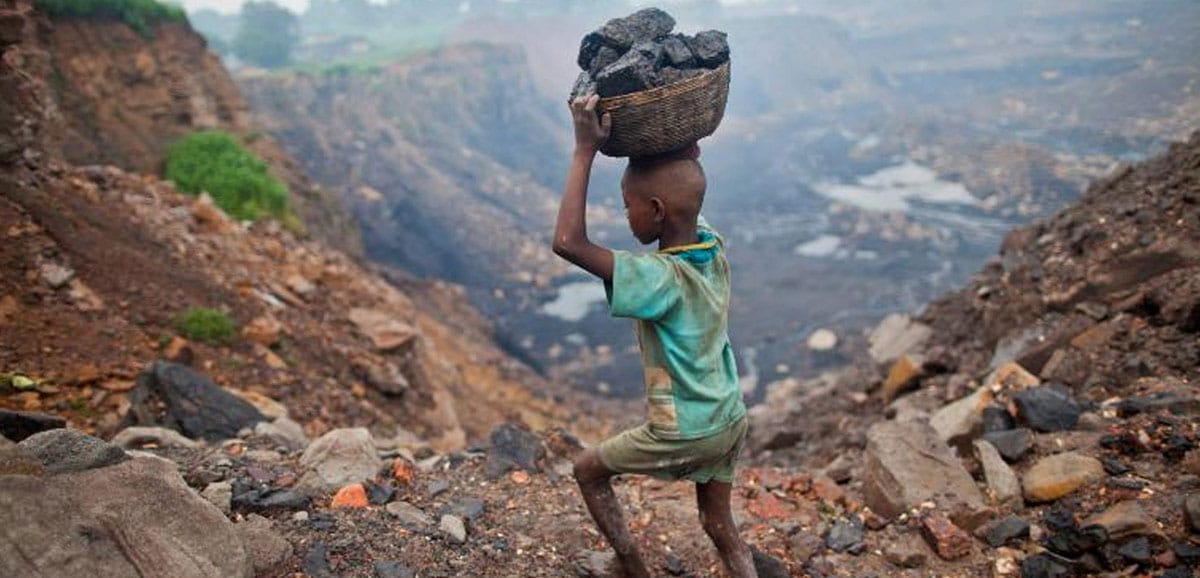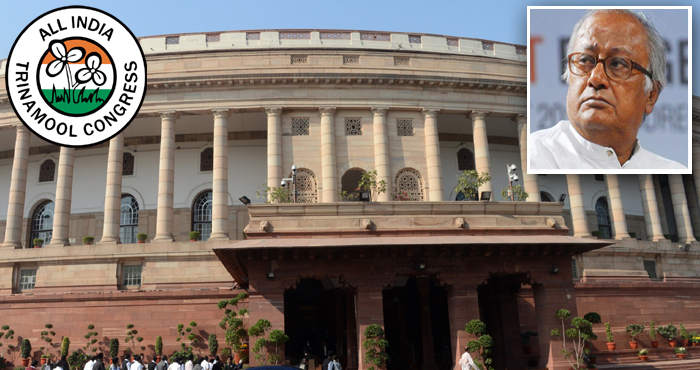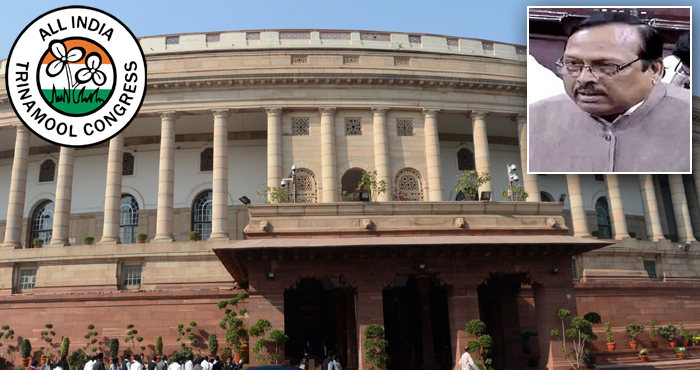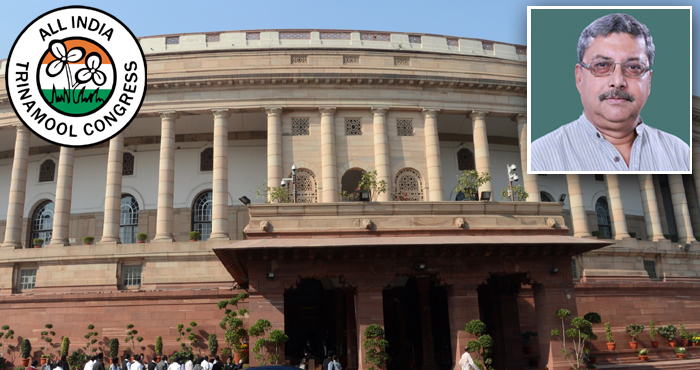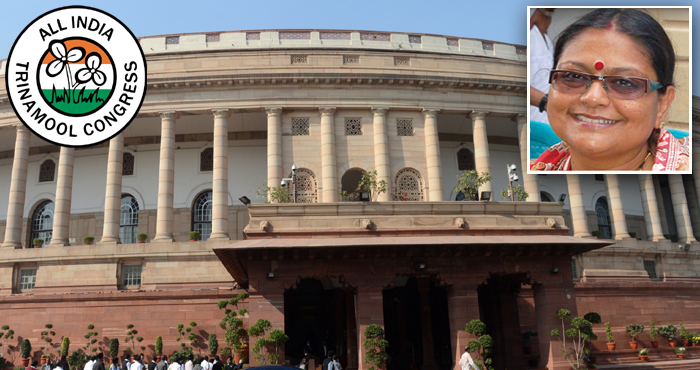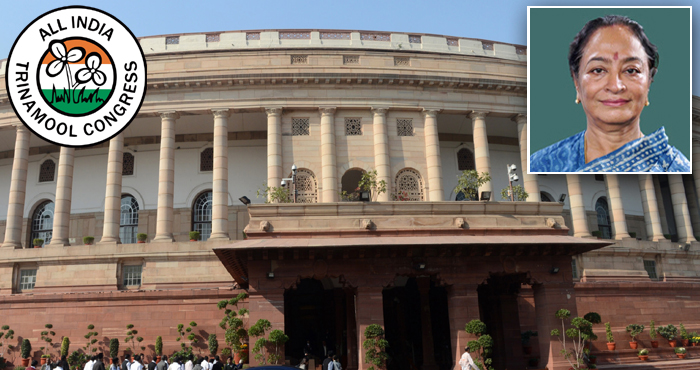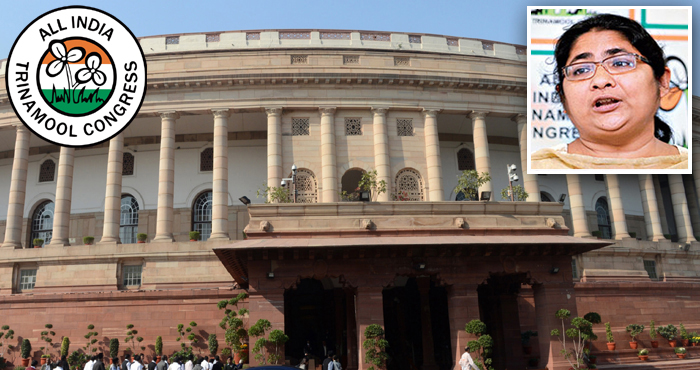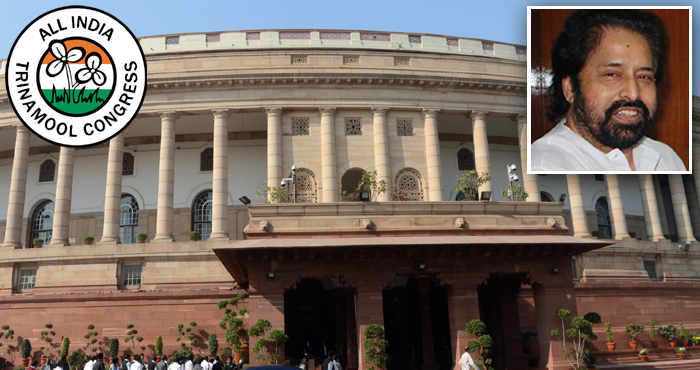All through the 2016 Winter Session of Parliament, the Opposition parties, including the Trinamool Congress, demanded discussion on demonetisation, the draconian decision that the Central Government had thrust on the people of the country.
However, the ruling dispensation repeatedly refused to heed this just demand from the Opposition parties, leading to constant disruptions.
The Trinamool Congress cornered the Centre over the issue of demonetisation in both the Lok Sabha and the Rajya Sabha right from the opening week.
On the opening day, that is, November 16, Trinamool Congress parliamentarians from both houses of Parliament staged a demonstration outside the Parliament in New Delhi, opposing the move of demonetisation by the Centre and demanding its rollback.
On the third day too, that is, November 18, too, the party’s MPs from both the Houses assembled near the Gandhi statue outside Parliament to stage a dharna, highlighting the plight of the common people due to demonetisation.
Trinamool Congress was the first political party to give a notice of suspension in the Rajya Sabha.
On November 17, in the Rajya Sabha, Derek O’Brien demanded voting after discussion on the issue of demonetisation. He said, “We think that beyond the debate there should be a voting”.
On the same day, in the Lok Sabha, Sudip Bandyopadhyay moved an Adjournment Motion under Rule 56 on the issue. He said, “Let this decision be withdrawn temporarily to chalk out a final plan”.
On November 18, Sudip Bandyopadhyay once again demanded a discussion under Rule 56 to censure the Central Government on demonetisation.
The second week of the 2016 Winter Session of Parliament was quite eventful. On November 24, Derek O’Brien in the Rajya Sabha gave a scathing reply to the Centre’s decision on demonetisation, outlining the hardships that the people of the country have been facing for the last 15 days (since demonetisation).
A day earlier, Sudip Bandyopadhyay in the Lok Sabha, as the voice of the united Opposition, had demanded a discussion on the issue of demonetisation under Rule 56, which entails voting after the debate.
On November 23, the opposition parties represented in Parliament, including Trinamool Congress, had staged a joint protest against the Government’s decision on demonetisation at the statue of Gandhi Ji inside the Parliament complex.
On November 25, Derek O’Brien strongly criticised the attitude of the Centre towards those who oppose its views and policies: “I said this in the House yesterday. If we oppose the Government’s policy it does not mean we are in favour of corruption”. He also asked for the Prime Minister to come to the Rajya Sabha and apologise for his comments earlier in the morning. He said, “Does the Prime Minister think he alone is a saint and we are all devils? The Prime Minister must come to the House and apologise”.
On the same day, Sudip Bandyopadhyay also came down severely on the Prime Minister’s insult to those opposing the draconian decision of demonetisation through his comments earlier that day. As he said, “On a day when we are trying to find a solution as to how the House can function, the Prime Minister has made comments that have hurt the Opposition. We demand that the Prime Minister withdraws his comments and apologises for the comments he has made”.
The third week of the 2016 Winter Session of Parliament saw the major Opposition parties demanding discussions on demonetisation and the presence of the Prime Minister during those debates as well.
Two major incidents were brought to the notice of the Parliament by the Trinamool Congress.
On the last day of the week, December 2, there was a furore in both Houses of Parliament over the issue of the sudden deployment of the Army in 19 places in Bengal, without discussing with the State Government.
In the Rajya Sabha, Sukhendu Sekhar Roy gave a notice under Rule 267 (suspension of business) and raised the issue, which was supported by all Opposition parties.
During the discussion, Derek O’Brien, the Leader of the Party in the Rajya Sabha, raised a Point of Order regarding the placing of selective documents by the Minister regarding the role of the Army.
Sudip Bandyopadhyay, the Leader of the Party in the Lok Sabha, raised the same issue.
A day before, on December 1, Derek O’Brien had demanded an enquiry to be instituted by the Government on the issue of the flight carrying Bengal Chief Minister Mamata Banerjee being denied immediate permission to land at Kolkata Airport, despite the pilot reporting the plane being short on fuel.
Sukhendu Sekhar Roy in the Rajya Sabha had made an important intervention after the Minister’s reply on the issue of the flight snag.
Sudip Bandyopadhyay had taken up the same issue in the Lok Sabha.
Earlier, on November 28, Sudip Bandyopadhyay had demanded the adoption of Adjournment Motion to enable discussion on demonetisation.
The next day, November 29, saw Sudip Bandyopadhyay asking for the clubbing of the discussions on demonetisation and the amendments brought in the Taxation Laws (Second Amendment) Bill, 2016, since the latter is related to demonetisation.
On the same day, Saugata Roy in the Lok Sabha demanded a full-fledged discussion on the Taxation Laws (Second Amendment) Bill, 2016, strongly criticising the Government’s decision to pass the Bill in a hasty manner.
On November 30, Derek O’Brien, demanded the presence of the Prime Minister in the Rajya Sabha during the debate on demonetisation.
Sukhendu Sekhar Roy in the Rajya Sabha gave a Notice under Rule 267, asking the Chairman to enable the House to make obituary references for the army jawans killed in clashes with terrorists in Jammu and Kashmir and for the people who had died as a consequence of the implementation of demonetisation.
In the Lok Sabha, on November 30, Sudip Bandyopadhyay again pressed the Speaker to grant the Opposition’s demand for a discussion on demonetisation, followed by voting.
Later in the day, Derek O’Brien demanded the Prime Minister withdraws his remarks on the Opposition outside Parliament before the debate on demonetisation can begin.
In the Lok Sabha, Sudip Bandyopadhyay repeated his earlier demand of the discussion on demonetisation to be taken up, along with voting.
Trinamool Congress staged a series of protests at the Parliament complex all through the fourth week of the Winter Session to protest against demonetisation.
December 8 was celebrated as Black Day by Opposition parties, being the completion of one month since the decision of demonetisation was announced. Members of Parliament from Trinamool Congress as well as other parties in the Opposition staged a protest at Parliament.
On the first day of the fourth week, December 5, Trinamool Congress staged a protest against demonetisation and its ill-effects at the statue of Mahatma Gandhi inside the Parliament complex.
On Friday, December 9, another protest was staged by Trinamool Congress MPs outside Parliament, who displayed a banner carrying the full list of names of the 93 people who have died so far as a consequence of demonetisation, while waiting in queues outside banks and ATMs.
Inside Parliament, the first day of session during this week, that is, December 5, saw Sudip Bandyopadhyay asking the Speaker of the Lok Sabha to enable the initiation of the discussion on demonetisation as early as possible, asking why the Government is shirking from a discussion time and again.
On December 7, Sukhendu Sekhar Roy in the Rajya Sabha raised a Point of Order regarding a BJP leader from Bengal being caught with lakhs of cash and arms.
On December 8, he asked the Deputy Chairman inside the House that the Rajya Sabha be allowed to mourn the tragic deaths due to demonetisation.
Sukhendu Sekhar Roy raised the issue of mourning the deaths once again on December 9.
Through the week, Congress had given a Notice for discussion under Rule 184 and the Trinamool Congress under Rule 56, while some others wanted it to take place under Rule 193.
On December 9, even a No Rule discussion on demonetisation was agreed upon by the Opposition parties in the Lok Sabha, wherein discussion was to have taken place under no specific rules. The MPs of the treasury benches (ruling coalition), though, refused to relent, disrupting the House repeatedly, preventing the Opposition members from speaking. Ultimately the House had to be adjourned for the day.
The final week of Parliament also saw the Opposition parties, including Trinamool Congress, demand discussions on demonetisation. However, the treasury benches continuously tried to disrupt proceedings.
On December 14, 16 leading Opposition parties held a joint press conference in New Delhi. Sudip Bandyopadhyay of Trinamool Congress said that the “voice of Opposition is being gagged” in Parliament and that “what is happening is not just unfortunate but disgraceful”.
In the Rajya Sabha, on December 14, Nadimul Haque spoke on behalf of the party supporting the Right of Persons with Disabilities Bill, 2014. A speech supporting the same Bill was given by Saugata Roy in the Lok Sabha on December 16.
On December 15, the Trinamool Members of Parliament held a protest against demonetisation outside Parliament.
On that same day, in the Lok Sabha, Sudip Bandyopadhyay even said that “a discussion could have been initiated, without any Rules”. However, the ruling party did not let it happen.
The 241st session of Parliament (Winter Session) ended on December 16.
একনজরে ২০১৬ সালের সংসদের শীতকালীন অধিবেশন: বিরোধীদের বৈধ দাবী মানল না সরকার
২০১৬র সংসদের পুরো শীতকালীন অধিবেশনে তৃণমূল সহ বিরোধী দলগুলি কেন্দ্রীয় সরকারের সারা দেশবাসীর ওপর চাপিয়ে দেওয়া নোটবাতিলের মর্মান্তিক সিদ্ধান্তের ওপর আলোচনার দাবি জানিয়ে গেল। সরকারের তরফ থেকে ক্রমাগত বাধা প্রদান করে আলোচনার থেকে তারা বিরত থাকল।
চলতি পার্লামেন্টের শীতকালীন অধিবেশনে লোকসভা ও রাজ্যসভা দু’জায়গাতেই কেন্দ্রীয় সরকারকে পুরো কোনঠাসা করল তৃণমূল কংগ্রেস। শীতকালীন অধিবেশনের প্রথম দিন মানে ১৬ই নভেম্বর পার্লামেন্টের সদস্যরা পার্লামেন্টের বাইরে বিক্ষোভ প্রদর্শন করেন এই নোট বাতিলের বিরুদ্ধে। তৃতীয় দিনেও একই ভাবে পার্লামেন্টের বাইরে তৃণমূল কংগ্রেসের পার্লামেন্টের সদস্যরা নোট বাতিলের ফলে সাধারণ মানুষের দুর্ভোগের প্রতিবাদে বিক্ষোভ প্রদর্শন করেন।
তৃণমূল কংগ্রেস প্রথম পার্টি যারা মুলতুবি প্রস্তাব আনেন রাজ্যসভায়। ১৭ই নভেম্বর রাজ্য সভায় ডেরেক ও ব্রায়েন আলোচনার পর ভোটের দাবি জানান। একই দিনে লোকসভায় সুদীপ বন্দ্যোপাধ্যায় ৫৬ নম্বর নিয়ম অনুযায়ী মুলতুবি প্রস্তাব আনেন ও বলেন একটি সুপরিকল্পিত পরিকল্পনা গ্রহণ করে তারপর এই নোট বাতিল কার্যকর করা হোক। পরের দিনও লোকসভায় সুদীপ বন্দ্যোপাধ্যায় একই দাবি তোলেন।
নানারকম ঘটনার মধ্যে দিয়ে কাটল পার্লামেন্টের শীতকালীন অধিবেশনের দ্বিতীয় সপ্তাহ। ২৪শে নভেম্বর রাজ্য সভায় ডেরেক ও ব্রায়েন উপযুক্ত জবাব দেন কেন্দ্রের এই দিশাহীন নোট বাতিলের তুঘলকি সিদ্ধান্তের ও তা কার্যকর করে বিগত ১৫ দিনের দেশের মানুষের কি পরিমান ভোগান্তি বাড়ানো হয়েছে, তার জবাব হিসেবে। তার আগের দিন সুদীপ বন্দ্যোপাধ্যায় লোকসভায় সকল বিরোধী দলের পক্ষ থেকে ৫৬ নম্বর নিয়ম মেনে নোট বাতিলের ওপর আলোচনা ও তার পর ভোটাভুটির দাবি তোলেন। ২৩শে নভেম্বর তৃণমূল কংগ্রেস সহ বিরোধী দলগুলি সংসদের সামনে গান্ধী মূর্তির তলায় একসঙ্গে বিক্ষোভ প্রদর্শন করেন কেন্দ্রের নোট বাতিলের তুঘলকি নীতির প্রতিবাদে।
যে সকল দল সরকার ও তার এই কার্যকলাপের বিরোধিতা করছে, তাদের প্রতি সরকারের আচরণের তীব্র সমালোচনা করেন ডেরেক ও ব্রায়েন। ২৫শে নভেম্বর, তিনি বলেন, “আমি গতকাল কক্ষে বলেছি, আমরা যদি সরকারের নীতির সমালোচনা করি, তার মানে এই না যে আমরা কালো টাকার পক্ষে”, তিনি প্রধানমন্ত্রীকে রাজ্যসভায় আসার ও সেদিন সকালে বিরোধীদের ব্যাপারে এরকম কটূক্তি করার জন্য ক্ষমা চাওয়ার দাবি জানান। তিনি বলেন, “প্রধানমন্ত্রী কি ভাবেন যে সব বিরোধীরা চোর আর উনি একা সাধুপুরুষ? প্রধানমন্ত্রী এই সভায় আসুন ও বিরোধীদের কাছে ক্ষমা চান।”
ওই দিনই তার কিছুক্ষন আগে সুদীপ বন্দ্যোপাধ্যায় লোকসভায় তীব্র প্রতিবাদ জানান প্রধান মন্ত্রীর বিরোধীদের ব্যাপারে কটূক্তির বিরোধিতা করে। তিনি বলেন , “যে সময় আমরা একটি উপায় খুঁজছি কি করে সভা চালানো যায়, সেসময় প্রধানমন্ত্রীর এরকম একটি উক্তি বিরোধী দলগুলিকে খুব বেদনা দিয়েছে। আমরা দাবি জানাই প্রধানমন্ত্রী তাঁর বক্তব্য ফিরিয়ে নিন ও বিরোধীদের থেকে ক্ষমা চান।”
২০১৬ সালের সংসদের শীতকালীন অধিবেশনের তৃতীয় সপ্তাহেও বিরোধীরা নোটবাতিল নিয়ে আলোচনার দাবিতে ও প্রধানমন্ত্রীর উপস্থিতিতে তর্ক করার দাবীতে সংসদ সরব রাখল।
দুটি বড় দুর্ঘটনা সংসদের নজরে আনল তৃণমূল কংগ্রেস। দোসরা ডিসেম্বর তৃতীয় সপ্তাহের অন্তিম দিনে পশ্চিমবঙ্গ সরকারের সঙ্গে কোনওরকম আলোচনা না করে রাজ্যের ১৯টি স্থানে সেনাবাহিনী মোতায়েন করার জন্য সংসদের উভয় কক্ষই উত্তাল রাখেন বিরধিরা। ২৬৭ নম্বর নিয়ম অনুযায়ী রাজ্যসভায় নোটিশ দেন রাজ্যসভার সাংসদ সুখেন্দু শেখর রায়, যা সকল বিরোধীদল সমর্থন করেন। আলোচনা চলাকালীন রাজ্যসভায় তৃণমুলের দলনেতা ডেরেক ও ব্রায়েন পয়েন্ট অফ অর্ডার ঘোষণা করেন যেখানে তিনি উল্লেখ করেন, সেনা মোতায়েন নিয়ে কেন্দ্রীয় মন্ত্রী কিছু বাছাই করা নথি পেশ করেছেন সংসদে।
লোকসভার দলনেতা সুদীপ বন্দ্যোপাধ্যায়ও একই ব্যাপারে কথা তোলেন। তার আগের দিন ডেরেক ও ব্রায়েন দাবি তোলেন মাননীয়া মুখ্যমন্ত্রী মমতা বান্দ্যপাধ্যায়ের বিমানচালক জ্বালানি কম থাকার কারনে বারবার বিমানবন্দরকে অনুরধ করা সত্তেও কেন তার বিমানকে নামতে দেওয়া হয়নি, সেই ব্যাপারে সরকার যাতে অনুসন্ধান করেন। কেন্দ্রীয় মন্ত্রী এই ব্যাপারে উত্তর দেওয়ার পর সুখেন্দু শেখর রায় একটি খুব মুল্যবান কথা বলেন।লোকসভায় সুদীপ বন্দ্যোপাধ্যায়ও একই ব্যাপারে কথা তোলেন।
২৮শে নভেম্বর সুদীপ বন্দ্যোপাধ্যায় মুলতুবি প্রস্তাব আনেন ও নোটবাতিলের ব্যাপারে আলোচনার দাবি জানান। তার পরের দিন, ২৯শে নভেম্বর সুদীপ বন্দ্যোপাধ্যায় নোট বাতিল ও আয়করের দ্বিতীয় সংশোধনী আইনের ব্যাপারে আলোচনার দাবি করেন কারন ওই দুটি বিষয় একে অপরের সঙ্গে জড়িত। ওইদিনেই লোকসভায় সৌগত রায় হঠকারী ভাবে সংসধনি আইন পাস করানোর তিব্র নিন্দা করেন ও বিস্তারিত আলোচনার দাবি জানান।
৩০শে নভেম্বর ডেরেক ও ব্রায়েন প্রধানমন্ত্রীর উপস্থিতিতে নোটবাতিলের অপর তর্কের দাবি তোলেন। ২৬৭ নম্বর নিয়ম মেনে রাজ্য সভায় সুখেন্দু শেখর রায়, রাজ্যসভার চেয়ারম্যানকে অনুরোধ করেন কাশ্মিরে নিহত সেনাদের সঙ্গে সঙ্গে নোটবাতিলের ফলে যারা মারা গেছেন তাদেরকেও শ্রদ্ধা জানাতে। ওইদিন লোকসভায় সুদীপ বন্দ্যোপাধ্যায় আবারও অধ্যক্ষকে দাবি জানান, নোটবাতিলের ওপর আলোচনা ও তারপর ভোটের। ওইদিনই ডেরেক ও ব্রায়েন দাবি করেন নোট বাতিলের ওপর আলোচনা শুরু করার আগে প্রধানমন্ত্রীকে ক্ষমা চাইতে হবে সংসদের বাইরে করা বিরোধীদের ব্যাপারে তাঁর কতুক্তি নিয়ে। লোকসভায় সুদীপ বন্দ্যোপাধ্যায় সেই একই দাবি তোলেন, নোটবাতিলের ওপর আলোচনা ও তারপর ভোটের।
সংসদের শীতকালীন অধিবেশনের চতুর্থ সপ্তাহে নোটবাতিলের বিরুদ্ধে সংসদ চত্বরে একগুচ্ছ ধর্না কর্মসূচীতে অংশগ্রহণ করল তৃণমূল কংগ্রেস।
নোটবাতিল ঘোষণার একমাস পুরন হয় ডিসেম্বরের ৮ তারিখ, ওইদিন সমস্ত বিরোধী দলগুলি মিলে কালা দিবস পালন করে। সংসদ চত্বরে তৃণমূল সহ অন্যান্য বিরোধী দলগুলি বিক্ষোভ দেখান। চতুর্থ সপ্তাহের প্রথম দিন অর্থাৎ ডিসেম্বরের ৫ তারিখ গান্ধী মূর্তির পাদদেশে তৃণমূল এই নোটবাতিল ও তাঁর খারাপ প্রভাবের বিরুদ্ধে ধর্না দেয়।
ডিসেম্বরের ৯ তারিখ আরেকটি বিক্ষোভ প্রদর্শন করেন তৃণমূল সাংসদদরা সংসদের বাইরে যেখানে তাঁরা একটি প্রতিলিপি প্রদর্শন করেন যেখানে ওই ৯৩ জন ব্যাক্তির নাম রয়েছে যারা এই নোটবাতিল ঘোষণার ফলে ব্যাঙ্ক ও এটিএমের লাইনে দাড়িয়ে জীবন দিয়েছেন। ডিসেম্বরের ৫ তারিখ লোকসভায় সুদীপ বন্দ্যোপাধ্যায় অধ্যক্ষর কাছে নোটবাতিলের ওপর দ্রুত আলোচনার দাবি জানান। সঙ্গে এও জানতে চান শাসক দল কেন এই আলোচনা থেকে পিছিয়ে যাচ্ছে?
ডিসেম্বরের ৭ তারিখ রাজ্যসভায় সুখেন্দু শেখর রায় বিজেপি নেতার বহু লক্ষ টাকা নিয়ে ধরা পড়ার ব্যাপারে পয়েন্ট অফ অর্ডার আনেন। ডিসেম্বরের ৮ তারিখ তিনি রাজ্য সভায় দাবি জানান এই নোটবাতিলের ফলে যেসকল মানুষ প্রান দিয়েছেন তাদের উদ্দেশ্যে রাজ্যসভায় শোক প্রকাশ করা হোক। ডিসেম্বরের ৯ তারিখেও তিনি রাজ্যসভায় একই দাবি রাখেন। পুরো সপ্তাহ ধরে কংগ্রেস নোটিশ দেন ১৮৪ নম্বর নিয়মে আলোচনা করার ও তৃণমূল ৫৬ নম্বর নিয়মে ও অন্যান্য দলগুলি ১৯৩ ধারায় নোটিশ দেন আলোচনার জন্য।
ডিসেম্বরের ৯ তারিখে কোনও নিয়ম না মেনেই বিরোধীরা আলোচনার জন্য রাজি হন। সরকার পক্ষের সাংসদরা এর বিরোধিতা করেন ও বারংবার সভা উত্তাল করে তোলেন ও বিরোধীদের কথা বলতে বাধা দেন। শেষ অবধি ওইদিনের মত কক্ষ মুলতুবি হয়ে যায়।
সংসদের শীতকালীন অধিবেশনের শেষ সপ্তাহেও নোটবাতিল নিয়ে আলোচনা হল না। বিরোধী দলগুলি আলোচনার দাবি জানালেও সরকার পক্ষ সমানে বাধা দিয়ে আলোচনা হতে দিল না।
ডিসেম্বরের ১৪ তারিখ বিরোধী দলগুলি যৌথ সাংবাদিক সম্মেলন করে। লোকসভায় তৃণমূল কংগ্রেসের দলনেতা সুদীপ বন্দ্যোপাধ্যায় বলেন, “বিরোধীদের কণ্ঠস্বর রোধ করা হচ্ছে। যা ঘটছে তা খুবই অনভিপ্রেত ও দুর্ভাগ্যজনক।” রাজ্যসভায় ডিসেম্বরের ১৪ তারিখ, নাদিমুল হক তৃণমূল কংগ্রেসের তরফ থেকে “The Right of Persons with Disabilities Bill, 2014″র পক্ষে সওয়াল করেন।
ডিসেম্বরের ১৫ তারিখ তৃণমূল কংগ্রেসের সাংসদরা নোটবাতিলের বিরোধিতায় সংসদ চত্বরে ধর্ণা দেন। ওই দিনই লোকসভায় সুদীপ বন্দ্যোপাধ্যায় বলেন, “কোনও নিয়ম ছাড়াই আলোচনা হতে পারে।“ যদিও সরকার পক্ষ সেটা হতে দেয় নি।
সংসদের শীতকালীন অধিবেশন শেষ হয় ডিসেম্বরের ১৬ তারিখ।

